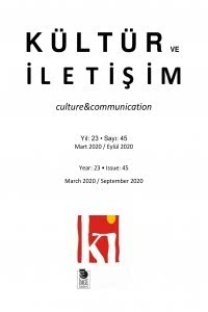Media and the Representation of the European Union An Analysis of Press Coverage of Turk:ey's European Union Candidacy
Media and the Representation of the European Union: An Analysis of Press Coverage of Turkey's European Union Candidacy
mainstream Turkish press, European identity Turkey,
___
- Ahmad, Feroz (1981). "The Political Economy of Kemalism." In Atatürk, Founder of Modern State. A. Kazancıgil and E. Özbudun (eds.). London: C. Hurst & Co. Unesco. 145-155.
- Akural, Sabri (1984), "Kemalist Views on Social Change." In Alatilrk and the Modernization of Turkey. J. M. Landau (ed.). Leiden. 125-152.
- Alankuş-Kural, Sevda (1995). "Türkiye'de Medya, Hegemonya ve Ötekinin Temsili." Toplum ve Bilim 67:76-111.
- Balkır, Canan and Williams, Alan M. (1993). Turkey and Europe. London: Pinter. Bell, Allan (1994). "Telling Stories." In Media Texts: Authors and Readers. David Graddol, Oliver Boyd Barrett (eds.). Clevedon, Philadelphia: The Open University, 100-118
- Bell, Allan and Garrett, Peter (1998). Approaches to Media Discourse. Oxford, Massachusets: Blackwell.
- Berberoğlu, Berch (1981). "Turkey: The Crisis of the Neo-Colonial System." Race& Class 22 (3): 277-291.
- Billig, Michael (1995). Banal Nationalism. London: Sage.
- Boorstin, Daniel J. (1992). The Image, A Guide to Pseudo-Events in America. New York: Vintage Books.
- Burgoyne, Carole B. and Routh, Davis A. (1999). "National Identity, European Identity and the Euro." In National Identity. Keith Cameron (ed.). Exeter. Intellect Books. 107-124.
- Cremasco, Maurizio (1990). "The Strategic Importance of Relations Between Turkey and the European Community." In Turkey and the European Community. A. Evin and G. Denton (eds.). Opladen: Leske Budrich. 117-140.
- ISSN: 1301-7241
- Yayın Aralığı: 2
- Başlangıç: 1998
- Yayıncı: İmge Kitabevi Yayınları
Methodology Issues: Problems in Published Empirical Research in Turkey
Turkish Broadcasting Policy in a Historical Context: Continuties and Discontinuties in the 1990s
Why Does Ideology Still Matter in Social Studies?
Media Policies in Turkey Since 1990
Olympic Dreams: Representations of Aborigines in the Australian Media
The Australian Media and International News
Peter Putnis, JOHN PENHALLURİCK, MİCHAEL BOURK
